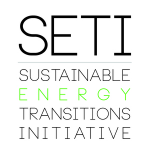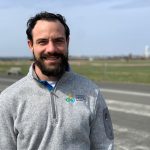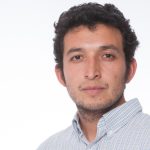Program Contributors – SETI 2023 Annual Workshop

Solomon Aboagye
Email: sbaboagye@gmail.com
Solomon Aboagye is a doctoral student at University of Cape Town and young research fellow at its Environmental Policy Research Unit (EPRU). Under the supervision of Prof Edwin Muchapondwa, Solomon is focusing on several aspects of households’ modern energy deprivations beyond connections and access based on the MTF Global survey of the World Bank/ESMAP. His research borders mainly on energy, environment and resource management as well as their interlinkages with other sectors of the economy and development. Solomon’s current publications are in the areas of emissions, efficiency and household energy decisions with focus on developing and emerging economies.

Raavi Aggarwal
Email: raavi.aggarwal@outlook.com
Raavi Aggarwal is a PhD candidate at the Technical University Berlin and Researcher at the Mercator Research Institute on Global Commons and Climate Change, Berlin. Her research analyses the distributional impacts of carbon pricing, gender norms, health and energy use, and emissions pricing policies in developing countries.

Gunther Bensch
Email: bensch@rwi-essen.de
Gunther Bensch is a development economist working at the interface of development, energy and environmental economics. Gunther is a researcher in the departments “Climate Change and Development” and “Environment and Resources” at RWI – Leibniz Institute for Economic Research, Germany. His particular research interests include the empirical analysis of markets for environmental goods and technologies, and the socio-economic impacts of development interventions, such as the dissemination of more efficient cookstoves. His research has been published in the Journal of Health Economics, the Journal of Economic Behavior and Organization, and World Development, among others.

Bishal Bharadwaj
Email: bishalbharadwajnp@gmail.com
Inclined to economic geography, I am interested in evaluating environmental policies (energy, plastic, pollution and climate change) in heterogeneous context to identify strategies to make sure the policies are effective and equitable. I currently work as Research Fellow at Curtin Institute of Energy Transition where I work on Energy and Development in Global South.

Dipendra Bhattarai
Dipendra Bhattarai is currently a PhD candidate at the University of Tasmania, affiliated with the School of Geography, Planning and Spatial Science at TerraLuma Lab. His research focuses on the energy sector, and he possesses extensive experience in sustainable development initiatives. Dipendra has collaborated with esteemed organizations such as Practical Action Consulting and Winrock International. During his tenure, he made significant contributions to various projects encompassing empirical analyses on subsidy distribution for rural off-grid energy, assessing energy access, implementing smart metering for off-grid technologies, and evaluating the performance of mini-grids. His involvement also extended to areas such as improved cookstoves, climate adaptation in hydropower, and rural electrification. Notably, Dipendra previously served as an Energy Expert at the International Centre for Integrated Mountain Development, where he conducted impact evaluation on financing and gender inclusion regarding the adoption of solar irrigation pumps.

Rikhia Bhukta
Email: rikhiab20@iitk.ac.in
I am a third year PhD student in the Department of Economic Sciences at Indian Institute of Technology Kanpur. My research interest lies in development economics, applied econometrics and policy evaluation. More specifically, I am interested in studying the driving factors behind economic and social progress of marginalised communities in India, like women and marginalised castes. I have a bachelor’s degree and a master’s degree in economics from Jadavpur University, Kolkata.

Sydney K. Chishimba
Email: CHSSYD001@myuct.ac.za
Sydney Kabango Chishimba is a PhD student in Economics at the University of Cape Town , School of Economics and working as a lecturer at the Copperbelt University in Zambia. His research interests include areas of climate change, energy economics, inequality and poverty in developing countries. The PhD research focuses on household energy access, gender and impact evaluation in developing countries.

Mauricio Hernández
Email: mmh54@duke.edu
Mauricio Hernandez is currently pursuing his PhD in Environment. Mauricio was born in Mexico City. He is currently using Human Learning and Machine Learning methods to improve the performance of Unit Commitment models on the the GRACE project. He has also done research on the dynamics of energy demand in Latin America. Specifically, he is working on bottom-up energy models to estimate the electricity demand in Mexico.

Debasish Das
Email: debasish.das@anu.edu.au
Debasish Das is currently pursuing a PhD in the Arndt-Corden Department of Economics at the Australian National University. He is also working as a research analyst with the World Bank East Asia and Pacific Unit. His research interests are in energy transition, electricity markets, household energy consumption, and behavioural economics. Debasish has engaged with a number of research projects in energy economics and has been working with all leading power distributors in Bangladesh. He is an applied econometrician and is currently working with very large datasets comprising of millions of data points to understand how the introduction of pre-paid metering can foster energy savings behaviours. He is an Erasmus Mundus scholar and has previously studied at the Universities of Queensland, Warwick, and Bonn.

Imelda
Imelda is the Assistant Professor of Economics at the Geneva Graduate Institute, research faculty at the Center for International Environmental Studies, and Abdul Latif Jameel Poverty Action Lab (J-PAL) invited researcher. She is an applied microeconomist and she received her PhD in Economics from the University of Hawaii in 2018. Her research explores the intersections of energy, health, gender, and environmental economics, looking at how clean energy transition and policies can improve welfare and market outcomes. More details: https://sites.google.com/view/iimelda/

Yusuph John Kulindwa
Email: yusuphkulindwaj@yahoo.com
Yusuph J. Kulindwa is a Lecturer at Moshi Co-operative University. He received his Ph.D. in Economics from a collaborative Ph.D. program at Dar es Salaam University, Tanzania, and Chalmers University, Sweden. His research focuses on Resource Economics, Energy economics, environmental and behavioral economics and impact evaluation studies. He is a team member and coordinator in the Pedagogy result area at MoCU in the Sustainable Employability through Innovative Pedagogy of Higher Education Institutions project, supported by the Finnish Ministry of Foreign Affairs. He has experience in international research projects, including the impact of externally funded climate adaptation projects on women’s empowerment funded by Sida Sarec as a Co-PI and involved in the project namely Higher Education Partnership for Climate Change Mitigation through Socio-technical Transition funded by the ministry for foreign affairs of Finland. He has published widely on environmental economics and sustainable resource management. His experience includes teaching and supervising research work for students. He is a research fellow of the EfD-Tanzania. He also serves as an internal Ph.D. examiner at Moshi Cooperative University and a peer reviewer of the journal called Energy Efficiency– Springer.

Samuel Miles
Email: samuel.b.miles@berkeley.edu
Sam Miles is a Ph.D. student in the Energy and Resources Group, and in the Renewable and Appropriate Energy Lab at the University of California, Berkeley. His research focus is at the intersection of the scalability challenge for electricity mini-??grids and the socio-??economic characteristics of urbanization in Africa, particularly for the artisans and entrepreneurs who constitute the ‘productive’ users of such energy systems. He engages with these questions as an INFEWS (Innovations at the Nexus of Food, Energy, and Water Systems and Digital Transformation of Development) NSF scholar. Previous to life at ERG, Sam worked as a freelance writer covering technology in emerging markets, an educator at the African Leadership University in Mauritius, and as an international development consultant with Dalberg based in West Africa. He holds an MA in International Energy from Sciences Po — Paris and a BA in Ethics, Politics, and Economics from Yale.

Archisman Mitra
Email: a.mitra@cgiar.org
Archisman Mitra is working as a Water Resource Economist with the International Water Management Institute (IWMI), on issues related to sustainable management of natural resources and evaluation of water policy instruments. He is based in New Delhi, India. Prior to joining IWMI, he was working at the International Maize and Wheat Improvement Center (CIMMYT).

Sarah Muñoz-Cadena
Email: sarahm.munoz@urosario.edu.co
Sarah is a junior researcher at the Universidad del Rosario and a researcher at Policéntrico. She gained a BSc in Political Science with minors in Journalism, and a BSc in Government and Public Affairs at Universidad de los Andes. She is studying for a Master’s degree in Economics of Public Policy at the Universidad del Rosario. Her research focuses on the governance of artificial intelligence and design thinking.

Olivia Muza
Olivia Muza is a Zimbabwean green growth economist and consultant working on determinant intersectionality and multidimensionality drivers of energy transitions and transformations in the global south with a keen interest on sub Saharan Africa. She is a Research Fellow at the African Centre of Excellence in Energy for Sustainable Development (ACE-ESD) where her research focused on Rwanda. She has practical programming work experience in food and nutrition security, livelihoods, education, markets for the poor, value chains, renewable energy, gender among others. She is a UN Women Empower Women Global Champion for Change (2016-2017), Co-Founder of STEAM Women and Director at Aivilo International Zimbabwe.

Tunmise Raji
Email: tr5979@rit.edu
Tunmise Raji is a third-year doctoral student at the Golisano Institute for Sustainability, Rochester Institute of Technology. His research focuses on utilizing remote sensing, and machine learning to investigate the potential for driving economic growth in rural Africa, particularly in the agricultural sector, through the implementation of renewable energy systems. Tunmise holds a B.Sc. in Electrical and Computer Engineering from the University of Ibadan and an M.Sc. from Carnegie Mellon University. Prior to his Ph.D., he worked as a Technical Analyst for Equatorial Power, an energy company specializing in developing renewable energy projects in East and Central Africa.

Matt Shupler
Email: m.shupler@liverpool.ac.uk
Dr. Matt Shupler is a Research Fellow at the University of Liverpool. Matt’s research is focused on reducing the adverse health and climate impacts of household air pollution from using polluting fuels (e.g. wood) for household energy, and the intersection of access to clean cooking and food security. He has previously worked as a Global Health Fellow at the United Nations Foundation (Clean Cooking Alliance) and collaborated with the World Health Organisation and Institute for Health Metrics and Evaluation to improve the Global Burden of Disease methodology for assessing the health impacts of household air pollution exposure.

Willah Nabukwangwa is a mixed-method researcher with more than 6 years of experience in data management, data analysis, program monitoring, research, and design. She is experienced in research including Air quality, HIV, Maternal Neonatal Health, and Public Health supporting projects. She has worked as a researcher in implementing diverse studies such as Modern Energy Cooking Services (MECs), Female Genital Mutilation (FGM), and Maternal Neonatal Health (MNH). Currently, Willah serves as a Research Officer and Analyst at KEMRI on CAA (Clean Air Africa) project, a school project implementing a national transition of schools from cooking with polluting wood fuel to LPG for the benefit of health and environmental co-benefits.

Suchita Srinivasan
I am currently a postdoctoral researcher and a lecturer at the Centre for Energy Policy and Economics at ETH Zurich, Switzerland. My research examines issues of environment and energy in developing countries, and seeks to empirically evaluate policy effectiveness, understand the role of social spillovers, and assess the importance of behavioural anomalies in determining household or firm-level decisions. I am also interested in analyzing the determinants of sustainable consumption behaviour.

Adolfo Uribe
Email: auribe@utalca.cl
Adolfo Uribe is Industrial Engineer (PUC, Chile), and is Ph.D. in Economics from Universidad de Talca, Chile. He has an MSc. in Environmental Engineering from the University of Stuttgart, Germany. His research focuses on two main topics. First, the impact evaluations of environmental policies on energy transitions, using quasi-experimental methods, combining primary data from the field with sensors and surveys. Second, the study of the institutional framework related to environmental compliance, enforcement, and sanctions across sectors such as mining, agroindustry, fishing, and others. Adolfo has proven experience building collaborative relationships among scientific research, stakeholders, and policy decision-makers in the context of energy transitions in Chile.

Rafia Zaman
Email: rafia.zaman@duke.edu
Rafia is an interdisciplinary researcher who works on sustainable electricity access policies and value-based electricity reliability. Her analyses consider market development, institutional governance, local politics, and distributional impacts associated with energy infrastructure investments in low-income contexts. She primarily uses quantitative approaches, drawing from methods used in development economics, spatial statistics, and in engineering sciences. At Duke, she conducts experimental and quasi-experimental research on themes related to energy development and inequality, including economic assessment of electricity access and reliability, evaluation of renewable technologies (e.g., solar home systems, solar irrigation) promotion policies, the political economy of energy (safety net programs), and development impacts of technology diffusion/adaptation. Rafia holds a PhD (in Sustainability and Innovation Management) from the University of Graz (FWF – DK Climate Change) in Austria and an MBA from the Asian Institute of Technology in Thailand.
